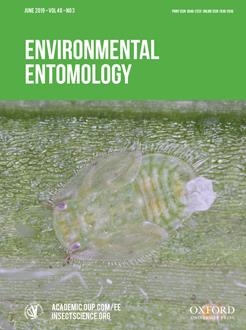Spalangia endius Walker is a parasitoid wasp that is commercially available as a biological control agent for filth fly pests in livestock-rearing operations. Imidacloprid is often used to control these flies. The present study examined the sublethal effect of field-realistic concentrations of imidacloprid on mating behavior, offspring sex ratios, and male preference for virgin females. After exposure to imidacloprid, S. endius females that survived were less likely to mate than control females, which will result in male-biased sex ratios because only mated females can produce daughters. Males did not avoid exposed females, but exposed females were almost always unreceptive. Males that survived exposure to imidacloprid exhibited reduced mating competitiveness against unexposed males. However, if an exposed male mated, his mate's sex ratio and ability to control flies was unaffected. Exposed males were also still able to discriminate against mated, and thus usually unreceptive, females. Together with previous studies, these results suggest that not only does imidacloprid reduce the ability of S. endius females to survive and parasitize hosts, but when an exposed female does survive and parasitize hosts, she is likely to produce just sons, because of her lack of receptivity. More-male-biased populations of S. endius will decrease their efficacy for fly control. Thus, the use of imidacloprid along with this parasitoid may be financially inefficient for pest management.
How to translate text using browser tools
15 March 2019
A Neonicotinoid Affects the Mating Behavior of Spalangia endius (Hymenoptera: Pteromalidae), a Biological Control Agent of Filth Flies
Aspen N. Kremer,
Bethia H. King
ACCESS THE FULL ARTICLE
It is not available for individual sale.
This article is only available to subscribers.
It is not available for individual sale.
It is not available for individual sale.

Environmental Entomology
Vol. 48 • No. 3
June 2019
Vol. 48 • No. 3
June 2019
beneficial insect
imidacloprid
parasitoid
sex ratio
sublethal effect




